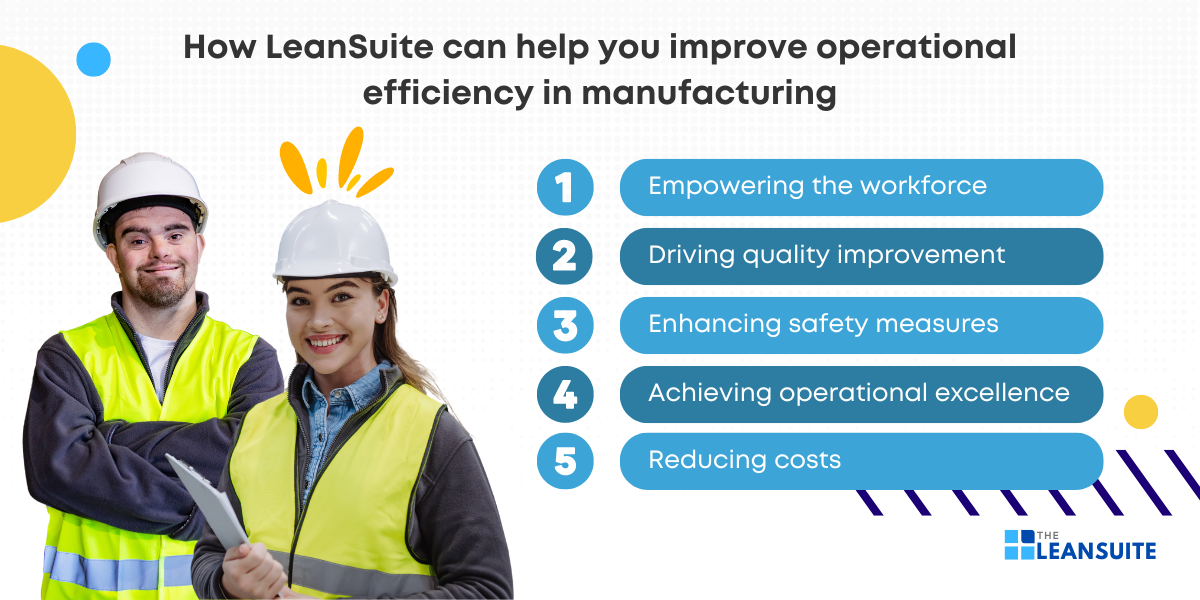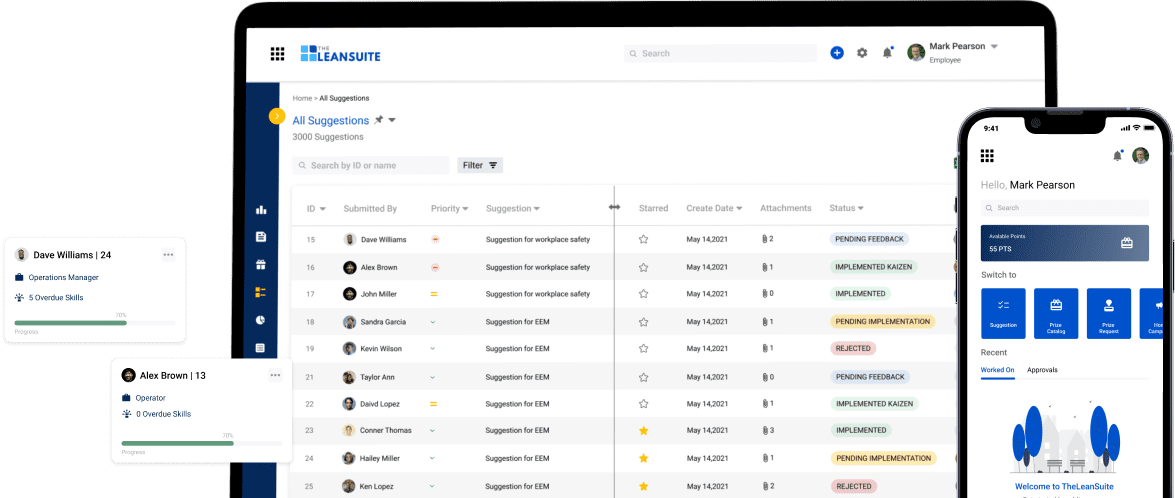What if you could transform your manufacturing operations into a model of efficiency and excellence? With LeanSuite, that transformation is possible. This comprehensive Lean manufacturing software is specifically designed to help organizations improve operational efficiency in manufacturing by automating critical processes and digitizing Lean initiatives. In this blog post, we’ll explore how this powerful platform can help you optimize operations and drive sustainable growth.
The challenges of traditional Lean manufacturing
Lean manufacturing, or Lean process management, provides various benefits for enhancing efficiency and minimizing waste. However, it has traditionally faced several challenges that can affect its successful implementation. Those challenges are:
- Paper-intensive: The nature of these processes is paper-intensive. This reliance on paper documentation not only increases the risk of errors, but also contributes to inefficiencies and environmental concerns. In other words, managing physical documents can be tedious and outdated in today’s digital age.
- Resource-heavy: Lean manufacturing tends to be resource-heavy. In fact, it requires significant investment in both human and material resources to train staff and maintain the system effectively. So, this can be particularly daunting for smaller businesses with limited budgets and personnel.
- Time-consuming to implement and maintain: Establishing these processes often demands extensive planning and ongoing adjustments, which can strain the capacity of organizations that are already stretched thin.
As a result, these challenges have traditionally discouraged smaller businesses from fully embracing Lean principles, even though doing so could lead to greater efficiency and cost savings.
Introducing LeanSuite: A digital platform for Lean manufacturing
LeanSuite streamlines Lean operations by moving from paper-based methods to a fully digital platform. In essence, it integrates all Lean manufacturing aspects into one system, enabling real-time data analysis, efficient communication, and workflow management. Additionally, with user-friendly interfaces and customizable dashboards, you can easily track, analyze, and optimize your manufacturing processes.
LeanSuite also offers scalability and flexibility. So, this makes it an ideal solution for businesses of all sizes aiming to adopt Lean principles. The platform’s cloud-based infrastructure ensures that companies can easily adjust their operations as they grow, without significant investments in new hardware or software.
Furthermore, LeanSuite incorporates advanced analytics and machine learning capabilities. Thus, enabling you to identify and address anomalies in your processes quickly. These features ensure continuous improvement and operational efficiency, allowing you to focus on innovation and customer satisfaction.
By offering accessible and adaptable tools, LeanSuite effectively transforms Lean manufacturing. As a result, this makes it attainable for businesses that previously found it challenging to implement.
How LeanSuite can help you improve operational efficiency in manufacturing

Empowering the workforce
One of LeanSuite’s key strengths lies in its ability to connect and empower employees through:
- Mobile accessibility: LeanSuite allows workers to access crucial information and report issues from anywhere on the manufacturing shop floor. In fact, this accessibility ensures that employees can swiftly address problems and retrieve data without having to return to a fixed workstation. Thereby, minimizing downtime and enhancing productivity.
- Enhanced communication: The platform facilitates enhanced communication with real-time notifications and updates that keep teams perfectly aligned. By providing instant alerts and updates, LeanSuite ensures that all team members are on the same page. Consequently, this reduces misunderstandings and improves coordination across shifts and departments.
- Skills development: LeanSuite is equipped with built-in training modules that support continuous learning and skills development. This feature encourages employees to engage in ongoing education, keeping their skills up-to-date and relevant. As a result, the workforce becomes more competent and capable.
Driving quality improvement
LeanSuite can significantly improve operational efficiency in manufacturing by driving quality improvement through:
- Standardized inspection processes: LeanSuite standardizes quality checks to ensure uniformity and reliability in operations. This reduces variation in inspections and enables clearer identification of defects and deviations. For that reason, this leads to consistent product quality and less waste by addressing issues earlier in production.
- Root cause analysis: LeanSuite offers tools for quickly identifying and resolving quality issues, allowing you to investigate the root causes of defects. Moreover, utilizing data-driven insights, your teams can target specific problems and implement solutions to prevent recurrence and improve product quality. This proactive method saves time and resources, while also promoting a culture of continuous improvement.
- Automated quality reporting: LeanSuite enables the creation of real-time reports that showcase key quality metrics. This allows your teams to make informed decisions and take quick corrective actions. Additionally, immediate access to quality data helps you promptly address issues. This, in turn, ensures smooth and efficient production without sacrificing quality standards.
Enhancing safety measures
LeanSuite prioritizes worker safety through:
- Digital safety audits: LeanSuite allows for streamlined inspections and follow-ups, making safety audits more efficient and less time-consuming. By digitizing the audit process, it ensures that inspections are thorough and consistent. Thereby, helping to identify potential hazards quickly and reliably.
- Safety-related issue reporting: With LeanSuite, logging and addressing safety concerns becomes an efficient process. The system facilitates quick reporting of any safety-related issue, ensuring that all issues are documented immediately and addressed promptly. This rapid response can prevent minor issues from escalating into major safety hazards.
- Safety training management: LeanSuite effectively tracks and schedules employee safety training. This feature ensures that all your team members are up-to-date with the latest safety protocols and certifications. Therefore, reducing the risk of accidents due to outdated knowledge or practices. By managing training schedules and progress digitally, LeanSuite helps maintain a well-informed workforce. This, in turn, enhances overall safety and operational efficiency in the manufacturing environment.
Achieving operational excellence
By integrating various aspects of manufacturing operations, LeanSuite enables:
- Process optimization: LeanSuite aids in identifying bottlenecks and inefficiencies within the manufacturing process. By analyzing workflows and pinpointing areas of delay or waste, it allows you to streamline operations, reduce cycle times, and improve throughput. This leads to more efficient production lines and higher productivity.
- Performance tracking: With LeanSuite, you can monitor Key Performance Indicators (KPIs) in real-time. This capability provides immediate insights into the performance of various processes, enabling quick, data-driven decision-making. By keeping a close eye on metrics such as production rates, machine utilization, and defect rates, you can ensure that you are meeting your operational goals and maintaining optimal performance.
- Continuous improvement: LeanSuite fosters a culture of continuous improvement by encouraging your teams to regularly review and refine their processes. It provides tools for feedback and collaboration, empowering your employees to contribute ideas for improvements and innovations. By promoting ongoing development and adaptation, LeanSuite helps you stay competitive and achieve operational excellence.
Reducing costs
LeanSuite’s comprehensive approach can greatly improve operational efficiency in manufacturing and reduce costs through:
- Waste reduction: LeanSuite helps identify and eliminate non-value-adding activities, which are those processes that do not contribute to the final product’s value. By streamlining operations and removing unnecessary steps, you can reduce excess production, minimize inventory, and cut down on waiting times, all of which lead to significant cost savings.
- Resource optimization: Effective resource allocation is crucial in manufacturing, and LeanSuite aids in optimizing both manpower and materials. By analyzing workflows and demand patterns, it ensures that the right amount of resources are available at the right time. Thereby, reducing overproduction and underutilization. This optimization not only enhances productivity, but also results in lower material and labor costs.
- Preventive maintenance: LeanSuite facilitates a proactive approach to equipment maintenance, which is key for reducing downtime and extending the life of machinery. By scheduling regular checks and maintenance tasks, you can prevent unexpected breakdowns. Thus, avoiding costly repairs and production halts. This ensures that equipment operates at peak efficiency and contributes to overall operational cost reductions.
Conclusion: Embracing the future of Lean manufacturing
LeanSuite represents a significant step forward in the evolution of Lean manufacturing. By leveraging digital technology and artificial intelligence, it makes Lean principles more accessible and effective for businesses of all sizes. As the manufacturing industry continues to evolve, tools like LeanSuite will play an important role in driving operational efficiency and maintaining competitiveness in the global market.





